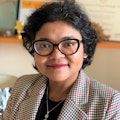Crisis-led approaches to teaching and learning in Bangladesh: new frameworks for outdoor, blended learning in low-income country contexts
This research examines crisis-led approaches to teaching and learning in Bangladesh in response to the coronavirus (COVID-19) pandemic.
Informing policy through the development of a framework to combine digital learning with outdoor learning for primary education in Bangladesh, to mitigate the impact of the pandemic, and to improve children’s educational and wellbeing outcomes in the longer term.
Detail
Education systems in low-income countries have rapidly responded to the coronavirus (COVID-19) pandemic with extremely limited resources, resulting in adaptive and unique approaches to teaching and learning (use of mobile phones; national television), but many children are missing out on critical periods of their education.
In Bangladesh, despite 99% of children being enrolled in primary schools, the majority learn in overcrowded classrooms and do not achieve the expected learning outcomes. Smartphones are widespread, but few children have access to computers and quality internet connections. Equally, children living in dense urban environments have poor access to greenspaces and associated wellbeing benefits.
Building on existing relationships with BUET (Bangladesh University of Engineering and Technology) and #NextGenEdu, and on Dr Khan’s previous research in primary schools in Bangladesh, this project addresses the challenges mentioned and surveys existing crisis-led responses to teaching and learning and builds a suite of case studies of home- and school-based urban gardening and food production which have emerged during the pandemic.
UN Sustainable Development Goals
This project contributes to a number of the UN Sustainable Development Goals that pertain to improving education, responding to and building on the challenges presented by the coronavirus (COVID-19) pandemic.
Primarily Goal 4 ‘Good Quality Education’, through exploring challenges associated with, and emerging approaches to, blended learning in a low-income country context.
Additionally, through a focus on combining digital and outdoor learning, this project will contribute to Goal 3 ‘Good Health and Wellbeing’, and Goal 11 ‘Sustainable Cities and Communities'.
Project aim
This project set out to understand the challenges that teachers and children learning in primary schools in Bangladesh faced during the coronavirus (COVID-19) pandemic. Building on this, it aimed to gain a baseline understanding that would contribute to a ‘blended learning framework’ that could be applied to other low-income country contexts to improve the quality of education integrating outdoor and digital tools in the longer term.
The project is undertaken in three phases:
- A telephone survey with teachers exploring their approaches to remote teaching and learning.
- Ethnographic studies of children and parents investigating their experiences of learning at home and the impact of this on children.
- School-based workshops with children and teachers to co-produce an implementation plan for blended learning. In addition, two workshops were held with stakeholders, first to map policy and practice needs and the second to disseminate the preliminary findings from the research.
Read our report from the first workshop.
Project partners
The project team
Principal investigator
Team
-

Senior Lecturer in Human Geography
-

Professor Dr Mohammed Zakiul Islam
Project lead in Bangladesh
-

Research Associate
-

Project Co-ordinator in Bangladesh
-

School Project Co-ordinator in Bangladesh
Support
This research was made possible through the support of the following organisations:


